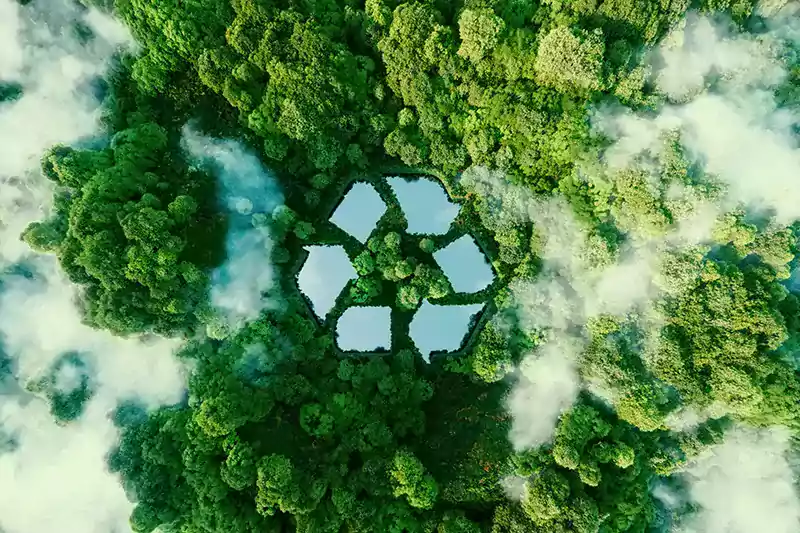The UK government has recently announced significant changes to the recycling regulations under the Environment Act 2021. These changes aim to simplify processes and boost recycling rates across the country.
At Ellgia, we are committed to informing our clients about the latest waste management and recycling developments that could impact their businesses, whether they are current customers or not. So, to help you prepare, here’s what you need to know about the upcoming changes and how they may affect your business operations:
Standardisation of Recyclable Materials
From March 2025 for non-household municipal premises, and by March 2026 for households, all local authorities in England will be required to collect a consistent set of recyclable materials.
Here are the materials you can expect to be recycled:
- Plastics: Including bottles, pots, tubs, trays, and certain types of plastic films by 2027.
- Glass: All glass bottles and jars.
- Metals: Tins and cans
- Paper and Card: Including office paper and cardboard, except materials like glittery or laminated paper.
- Food Waste: All food intended for human or household pet consumption, alongside biodegradable waste from food preparation.
This initiative ensures materials are recyclable across England, simplifying protocols and enhancing sustainability efforts.
Simplified Bin Collections
To reduce the clutter of multiple bins, the following waste stream divisions are expected:
- Dry Recycling Bin: For paper, cardboard, tins, cans, and plastics. Glass often remains a separate stream to prevent contamination and maintain the quality of recycled materials.
- Food Waste Bin: Dedicated to all biodegradable food waste.
- Residual Waste Bin: For non-recyclable waste.
Businesses typically operate under different conditions compared to household waste collections, allowing more flexibility in managing recycling streams to ensure high-quality material recovery. For Ellgia, we will typically separate Paper & Card, Tins & Cans, Plastic tubs and bottles and plastic films, and if needed a separate glass bin.
Frequent Collections
The legislation introduces minimum standards for household waste collection frequencies, aiming to collect residual waste at least fortnightly and food waste weekly. For businesses, however, waste collection frequency can be tailored to specific needs and is not mandated by this regulation. You can choose how frequently your waste is collected, whether it's weekly or less frequently, based on your operational requirements.
Impact on Businesses
All businesses, especially non-household municipal premises, must adapt to these new recycling requirements by March 2025, except for micro-enterprises, which have until March 2027. A micro-enterprise or micro-firm is defined as a business with fewer than 10 full-time equivalent (FTE) employees. This provides flexibility for smaller businesses to adjust to the new standards gradually.
Ellgia’s Commitment
Jack Lavington, Managing Director of Ellgia, emphasises our commitment: "At Ellgia, we're fully committed to ensuring that our clients meet these new standards and contribute positively to our collective environmental efforts. We're dedicated to supporting your transition to these new practices and ensuring they are seamless and effective. Together, we're fostering a culture of sustainability that will benefit our community and the planet for future generations."
At Ellgia, we understand that adapting to new compliance requirements can be challenging. We are here to support your business through these changes. We offer comprehensive waste management solutions tailored to the new regulations, helping you optimise your recycling processes and ensure compliance. Our team is ready to assist with implementing effective waste segregation systems, providing suitable bins, and offering regular collection services that meet regulatory standards.
We will contact all existing customers to discuss how these changes affect their specific circumstances and ensure smooth compliance.
For more detailed information on how these changes might impact you and how Ellgia can assist, please visit our Simper Recycling webpage.
Together, let's embrace these changes and move towards a more sustainable future.
Conclusion
It is important to be aware of regulations and laws surrounding the safe disposal of batteries - businesses could face a fine of up to £5,000 if they fail their duty of care. More information on what is required can be found on the UK government website under Regulations: waste batteries.
Ellgia are dedicated to ensuring local businesses fulfil their duty of care and compliance with legislation. We can safely handle and dispose of most battery types. For more information on how we manage hazardous waste, visit our dedicated page.




